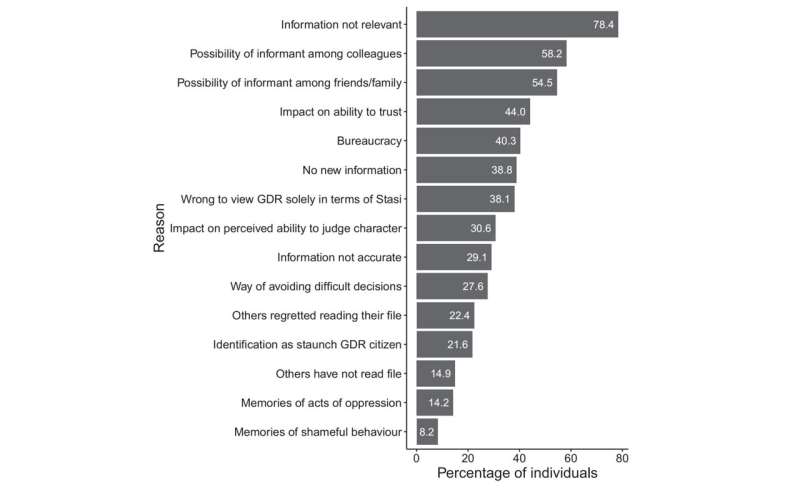Exploring the reality of unread Stasi files

Many people—including public figures such as Nobel Laureate Günter Grass, former West German chancellor Helmut Schmidt, and trade union leader Claus Weselsky—choose not to read their Stasi files. How can this behavior be explained? And what are the implications for the collective approach to remembrance and transparency in post-dictatorial societies? A study by the Max Planck Institute for Human Development and the Technical University of Dresden provides insights into these questions.
Wiretapping, bugging, and tracking: The German Democratic Republic (GDR) went to extraordinary lengths to control its citizens. In countless files, employees and collaborators of the Ministry for State Security—commonly known as the Stasi—reported in detail on the lives of GDR citizens and foreign nationals alike. After the collapse of the GDR in 1989 the Stasi files were seized, and in 1991 the archives were opened.
In the following three decades, over 2 million citizens applied to view their files. But it seems likely that the majority of those affected have not taken the opportunity to read their files. The researchers estimate that if all GDR citizens who believed a file on them exists had applied for access, there would have been about 5 million applications.
So why do so many people not want to know whether they were spied on or betrayed—and by whom? “What we are dealing with here is the psychological phenomenon of deliberate ignorance,” says Ralph Hertwig, Director at the Center for Adaptive Rationality. “Sometimes people deliberately decide to forgo potentially important information. And it’s not because they are sticking their head in the sand—their decisions are driven by considerations that can range from regulating anticipated negative emotions to justice concerns.”
In order to investigate people’s reasons for not viewing their Stasi files, researchers from the Max Planck Institute for Human Development and the Technical University of Dresden combined survey methods from psychology with life history interviews.
More than 160 people contacted the research team in response to radio and newspaper interviews showcasing the research topic. Of these, 134 participated in a survey and another 22 in semi-standardized interviews.
The survey revealed a broad spectrum of reasons for deliberate ignorance: The reason given most often (78.4%) was that the information in the files was no longer relevant.
Other prevalent reasons were that colleagues (58.2%) or friends or family members (54.5%) might have worked as informants, or that the information might negatively impact respondents’ ability to trust others (44%). The bureaucracy involved in applying to view one’s file was cited by 40% of respondents. Others questioned the utility and credibility of the information contained in the files: Nearly two in five respondents (38.8%) believed that they already knew what was in their file, and almost one-third (29.1%) doubted the accuracy of the information it contained.
Political beliefs and dissatisfaction with the public discourse on the GDR past also contributed to respondents’ reluctance to view their file: Some 38% thought it was wrong to view the GDR solely in terms of the Stasi. About another 22% did not read their file because they identified as staunch citizens of the GDR.
For some respondents, the choice not to read their file was informed by others’ experiences and behavior: Around 22% refrained from reading their file because they knew people who regretted having done so and about 15% because most people around them had not read their file either.
The results of the semi-standardized interviews revealed that the participants prioritized their social relationships and maintaining harmony among family, friends, and acquaintances over other reasons. In contrast, the collective remembrance culture sees transparency and knowledge as instrumental for shaping a better society in the present and future.
“While individual memory and public memory culture influence each other, the underlying motives may evidently diverge. This congruence or lack thereof is an important factor in the pace of social change,” says Dagmar Ellerbrock, professor of modern and contemporary history at the Technical University of Dresden. Together with Ralph Hertwig, she led the research project “The Unread Stasi Files: Deliberate Ignorance and Transformation.”
Little is yet known about deliberate ignorance at the individual level in times of social transformation, she continues. Although there has been extensive research in Germany, for example, into people’s denial of their support for or active complicity in the crimes of the Nazi regime, the individual motives behind this denial and, above all, its relationship to collective cultures of remembrance have yet to be studied. The opening of the Stasi files offers a unique opportunity to explore how citizens of a collapsed state make sense of their choice not to look into the past.
Ralph Hertwig et al, Why people choose deliberate ignorance in times of societal transformation, Cognition (2022). DOI: 10.1016/j.cognition.2022.105247
Provided by
Max Planck Institute for Human Development
Citation:
Exploring the reality of unread Stasi files (2022, September 27)
retrieved 28 September 2022
from https://phys.org/news/2022-09-exploring-reality-unread-stasi.html
This document is subject to copyright. Apart from any fair dealing for the purpose of private study or research, no
part may be reproduced without the written permission. The content is provided for information purposes only.
For all the latest Science News Click Here
For the latest news and updates, follow us on Google News.

